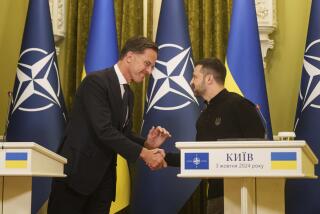Oh My, How Ever So Polite : * NATO Summit Seeks to Ease Soviet Fears
- Share via
The North Atlantic Treaty Organization, created 41 years ago to fight the Cold War in Europe, has offered to join the Soviet Union in declaring that war over.
Of course, a formidable round of troop negotiations and treaty drafts is still needed. But the immediate purpose of the two-day meeting in London appears already in hand--putting Soviet leadership at ease about NATO’s harmless intentions.
One important part of this paper work of peace would be a NATO commitment to keep the fighting forces of a unified Germany below threatening levels. Even though the language of the NATO communique was not nearly that blunt and West German Chancellor Helmut Kohl did get to make the first public mention of limits on German troop strength, the message was clear. NATO intends alliance membership to be more a restraint on a unified Germany than anything else.
The offer of a formal truce, no matter long it might be in coming, was clearly welcome in the Kremlin. Soviet spokesman Gennady I. Gerasimov said the offer would strengthen the hand of Mikhail S. Gorbachev against Soviet hawks who claim that his military policies weaken Soviet security.
Everything the NATO leaders did seemed calculated to that end. President Bush’s idea of re-wording NATO policy to pledge that nuclear weapons would be used only as a last resort was more diplomatic than doctrinal but it served its purpose. So did the invitation to Gorbachev and other East European leaders to address NATO’s policy group, the North Atlantic Council.
Translating some signals of peaceable intent into action will take time. But at least the summit leaves East and West pulling together and not apart. Although change swept so much of the old order out last year, it still seemed a bit strange this week to read a NATO communique patting Moscow on the back for having embarked on “the long journey toward a free society,” but there it was.
The NATO heads of state called on negotiators to go into continuous session to cut forces in Europe. They urged military leaders from East and West to hold a second meeting this year to talk about forces and strategy and promised to work harder on an “Open Skies” policy that would make it difficult for any nation to move troops or build weapons unseen. They called for a full-time Conference on Security and Cooperation in Europe--the only institution that embraces countries of both NATO and the Warsaw Pact. Its mission, they said, should include promoting democracy, encouraging competitive economies and establishing a center for “prevention of conflict”.
This all sounds very lovely indeed. But is Europe really on the verge of converting from a potential nuclear battleground into an Oxford Union debating club? The very fact that the question can be asked is a measure of how much things have changed.
More to Read
Sign up for Essential California
The most important California stories and recommendations in your inbox every morning.
You may occasionally receive promotional content from the Los Angeles Times.










